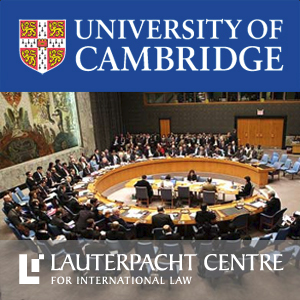Hersch Lauterpacht Memorial Lecture 2017: Part 2: "The Privatisation of International Organisations"
Duration: 57 mins 33 secs
Share this media item:
Embed this media item:
Embed this media item:
About this item

| Description: |
The Hersch Lauterpacht Memorial Lecture is an annual lecture series given in Cambridge to commemorate the unique contribution to the development of international law of Sir Hersch Lauterpacht. These lectures are given annually by a person of eminence in the field of international law and a revised and expanded version of the lectures is usually published in the Hersch Lauterpacht Lecture Series by Cambridge University Press. The lecture comprises three parts, delivered on consecutive evenings, followed by a Q&A session on the fourth day.
The 2017 Hersch Lauterpacht Memorial Lecture series, entitled 'Privatisation Under and Of Public International Law' was delivered at the Lauterpacht Centre for International Law, University of Cambridge, by Professor Anne Peters, Director at the Max Planck Institute for Comparative Public Law and International Law Heidelberg , from Tuesday 7 to Friday 10 March 2017. This part, entitled 'The Privatisation of International Organisations', is the second of the three lectures given. |
|---|
| Created: | 2024-12-16 11:52 |
|---|---|
| Collection: | LCIL International Law Seminar Series MOVED |
| Publisher: | University of Cambridge |
| Copyright: | Daniel Bates |
| Language: | eng (English) |
| Abstract: | International law has emerged out of (Roman) private law sources and analogies, as Hersch Lauterpacht has shown. One might call this the publicisation of private law-bits and pieces to shape a droit public européen and a public international law.
The last decades have brought about counter-trends of privatisation. First, states have radically and often under pressure by international and regional financial institutions divested themselves of infrastructure and handed over tasks and services to the private sector. This is the privatisation under public international law. Second, global markets, global corporations, and global supply chains have begun to shape not only the substance of international law but also its structure (in terms of legal subjects and legal sources/instruments). This is the privatisation of public international law. Privatisation under international law and privatisation of international law are linked, because the rise of the private sector (business), the concomitant shrinking of states, and the deep engagement of international organisations (IOs) with private partners have been transforming the international legal persons themselves, the international law-making processes, and the legal outcomes, too. Lauterpacht' s original intention of strengthening the element of law, and of countering lawlessness in international relations was in 1927 served by drawing on private law as the best available model of law existing at the time. Ninety years later, Lauterpacht's quest for a "reign of law" in what we now call global governance can be best satisfied by acknowledging and carving out the public-law quality of international law while accommodating and integrating the increasingly important private actors into global governance. Part 2: The Privatisation of International Organisations Lecture 2 deals with the privatisation of international organisations (IOs). Recently, IOs are under financial stress and follow the model of their members states, reorganising themselves according to the private-law oriented model of New Public Management (NPM). They also increasingly procure goods and services of all kinds, including military and security services, in order to fulfil their missions. Another novel type of privatisation are "private sector partnerships" of IOs, notably in the fields of environmental action, humanitarian action, development, refugees, and health. The burgeoning engagement of IOs with the private sector raises similar problems as within states, but a layer of complexity is added. We here see a double delegation of public functions: From states (as principals) to IOs, and from there to the private sector. This duality does not demand totally novel principles governing privatisation but adaptations, e.g. regarding human rights obligations of IOs. To fill accountability gaps, the immunities of organisations should be limited to acta iure imperii of IOs. |
|---|---|

